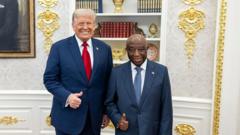In a recent letter addressed to Canadian Prime Minister Mark Carney, President Trump announced plans for a 35% tariff on Canadian imports, alongside similar threats to other trade partners. The proposed tariffs are part of ongoing trade discussions and are tied to U.S. grievances regarding drug trafficking and trade imbalances.
Trump Proposes 35% Tariffs on Canada Amid Trade Negotiations

Trump Proposes 35% Tariffs on Canada Amid Trade Negotiations
President Trump has threatened to impose significant tariffs on Canadian goods starting August 1, intensifying trade tensions as negotiations loom.
In a significant escalation of trade tensions, U.S. President Donald Trump unveiled plans to impose a 35% tariff on Canadian goods, effective August 1. This announcement comes just days before a self-imposed deadline for reaching a new trade agreement with Canada, further complicating ongoing negotiations. The letter detailing the tariffs was shared via social media, addressed to Prime Minister Mark Carney.
This new tariff threat is part of a broader range of levies Trump is considering against multiple trade partners, including Japan, South Korea, and Sri Lanka. Already, the U.S. has implemented a 25% tariff on certain Canadian goods, which has had a noticeable impact on Canada's economy, particularly in key sectors like auto manufacturing and metals, given that about 75% of Canadian goods are exported to the U.S.
Trump's letter highlighted that these new 35% tariffs would be distinct from existing sector-specific levies. He underscored that the tariffs could be reconsidered if Canada were to enhance its cooperation with the U.S. on stopping the flow of fentanyl and addressed U.S. concerns over Canadian tariffs on American dairy exports. Notably, only a small fraction of fentanyl seizures occur at the Canadian border, indicating that the flow of drugs is more prevalent via the U.S.-Mexico border.
In response to these escalating tensions, Canada has begun to increase its border security funding and appointed a special advisor to tackle the fentanyl issue earlier this year. Following the G7 Summit agreement, where leaders committed to reaching a trade deal within 30 days, Canada reiterated its commitment to negotiations despite the tariff threats.
Moreover, both countries have faced mounting pressure, with Canada implementing counter-tariffs on U.S. goods in anticipation of retaliation if negotiations fall through. Recently, Prime Minister Carney removed a proposed tax on major U.S. technology companies in an effort to facilitate smoother discussions with the Trump administration.
As the deadline approaches, both sides remain cautious, aware that failure to reach a compromise could lead to an escalation of tariffs and further strain trade relations. The Canadian government has yet to provide a response to Trump's recent letter, leaving the situation fluid as negotiations continue.




















